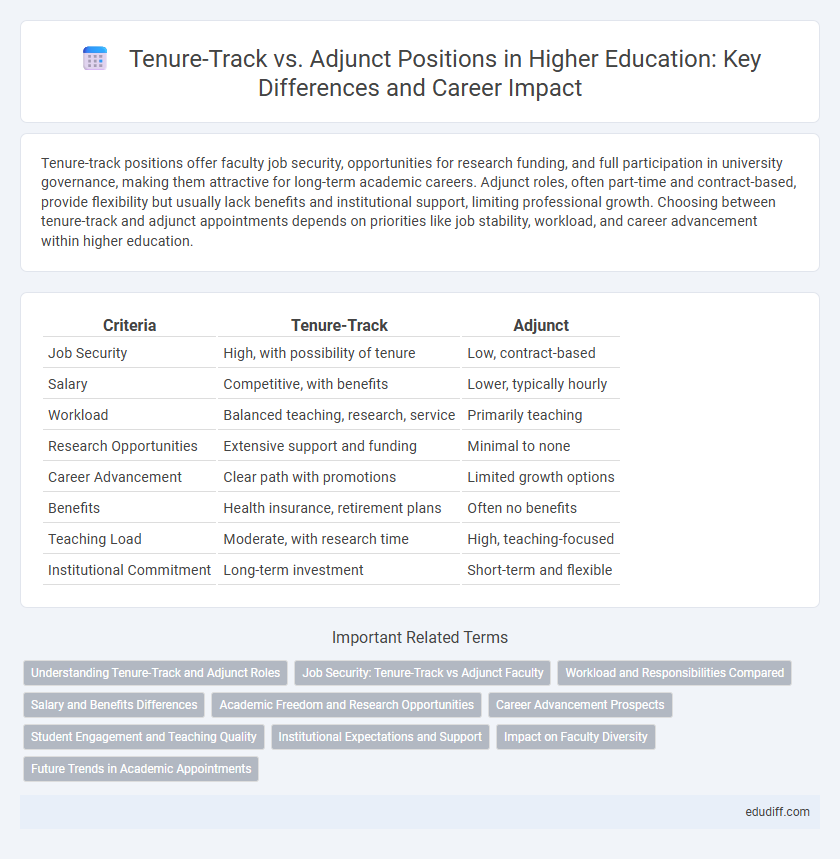Tenure-track positions offer faculty job security, opportunities for research funding, and full participation in university governance, making them attractive for long-term academic careers. Adjunct roles, often part-time and contract-based, provide flexibility but usually lack benefits and institutional support, limiting professional growth. Choosing between tenure-track and adjunct appointments depends on priorities like job stability, workload, and career advancement within higher education.
Table of Comparison
| Criteria | Tenure-Track | Adjunct |
|---|---|---|
| Job Security | High, with possibility of tenure | Low, contract-based |
| Salary | Competitive, with benefits | Lower, typically hourly |
| Workload | Balanced teaching, research, service | Primarily teaching |
| Research Opportunities | Extensive support and funding | Minimal to none |
| Career Advancement | Clear path with promotions | Limited growth options |
| Benefits | Health insurance, retirement plans | Often no benefits |
| Teaching Load | Moderate, with research time | High, teaching-focused |
| Institutional Commitment | Long-term investment | Short-term and flexible |
Understanding Tenure-Track and Adjunct Roles
Tenure-track positions offer faculty members a pathway to job security and academic freedom through a rigorous evaluation process culminating in tenure, typically after six to seven years. Adjunct roles are contract-based, often part-time, with limited job security and fewer institutional benefits, focusing primarily on teaching rather than research or service obligations. Understanding the distinct responsibilities and expectations of tenure-track versus adjunct faculty is crucial for navigating career pathways within higher education institutions.
Job Security: Tenure-Track vs Adjunct Faculty
Tenure-track faculty positions offer significantly greater job security due to the potential for tenure, which provides long-term employment and protection against arbitrary dismissal. Adjunct faculty typically face precarious employment with contracts renewed semester-by-semester, lacking benefits and stability. The contrast in job security between tenure-track and adjunct roles impacts career planning, financial stability, and academic freedom within higher education institutions.
Workload and Responsibilities Compared
Tenure-track faculty typically manage a balanced workload that includes teaching, research, and administrative duties, often requiring a higher level of scholarly output and service commitments. Adjunct instructors primarily focus on teaching, usually handling multiple courses across institutions with limited involvement in research and administrative tasks. This distinction results in tenure-track roles demanding long-term institutional engagement and performance evaluations, while adjunct positions offer greater flexibility but less job security and fewer responsibilities beyond classroom instruction.
Salary and Benefits Differences
Tenure-track faculty positions typically offer higher salaries compared to adjunct roles, often including comprehensive benefits such as health insurance, retirement plans, and paid leave. Adjunct instructors usually receive lower hourly wages without access to institutional benefits, leading to financial instability. This disparity highlights the economic advantages tied to the tenure-track pathway within higher education institutions.
Academic Freedom and Research Opportunities
Tenure-track positions offer greater academic freedom and extensive research opportunities due to job security and institutional support, enabling faculty to pursue innovative and long-term projects without external pressures. Adjunct faculty often face limited access to research funding and institutional resources, which restricts their ability to engage in comprehensive scholarship. The secure environment of tenure-track roles significantly enhances faculty autonomy and fosters a robust research agenda essential for academic advancement.
Career Advancement Prospects
Tenure-track positions offer greater career advancement prospects through structured promotion pathways, job security, and access to research funding critical for academic growth. Adjunct faculty often face limited opportunities for professional development, lacking institutional support that facilitates tenure and leadership roles. Pursuing a tenure-track role significantly enhances long-term career stability and progression within higher education.
Student Engagement and Teaching Quality
Tenure-track faculty often demonstrate higher student engagement due to their sustained commitment to academic communities and access to resources supporting research-informed teaching practices. Adjunct instructors face challenges such as limited job security and institutional support, which can impact the consistency and depth of student interaction. Empirical studies reveal tenure-track professors generally achieve better teaching quality outcomes, reflected in higher student satisfaction and improved learning retention rates.
Institutional Expectations and Support
Tenure-track faculty receive clear institutional expectations centered on research productivity, teaching excellence, and service commitments, along with substantial support such as research funding and professional development resources. Adjunct faculty often face limited expectations focused primarily on teaching, with minimal access to institutional support and fewer opportunities for professional growth or involvement in governance. This discrepancy impacts job security, career advancement, and overall faculty integration within higher education institutions.
Impact on Faculty Diversity
Tenure-track positions significantly influence faculty diversity by offering stability, competitive salaries, and pathways for career advancement that attract a broader range of candidates from underrepresented groups. Adjunct roles, often characterized by low pay, job insecurity, and limited professional development, hinder efforts to diversify faculty. Institutions emphasizing increased tenure-track opportunities tend to see measurable improvements in faculty representation across race, gender, and minority status.
Future Trends in Academic Appointments
Future trends in academic appointments emphasize a gradual shift from adjunct to tenure-track positions due to increasing demands for research output, job security, and faculty governance involvement. Universities are investing in tenure-track roles to foster long-term institutional loyalty and innovation, driven by evolving accreditation standards and funding models. Data from the National Center for Education Statistics highlights a slow but steady rise in tenure-track hiring in STEM and humanities fields, reflecting a strategic rebalancing of faculty composition.
Tenure-Track vs Adjunct Infographic

 edudiff.com
edudiff.com